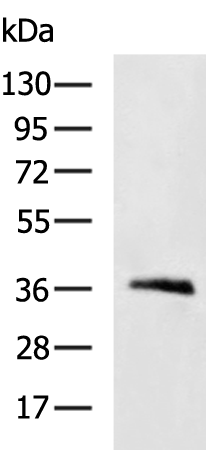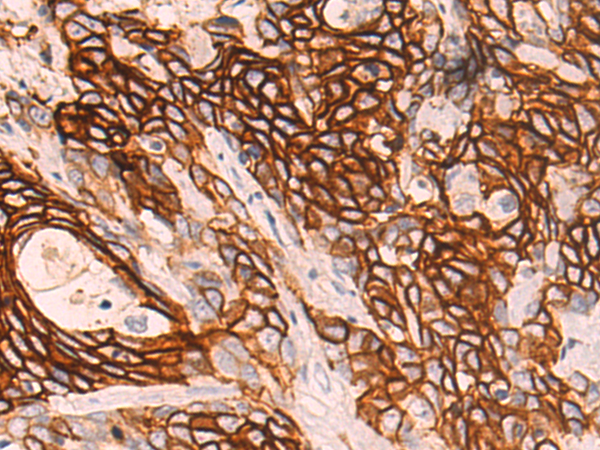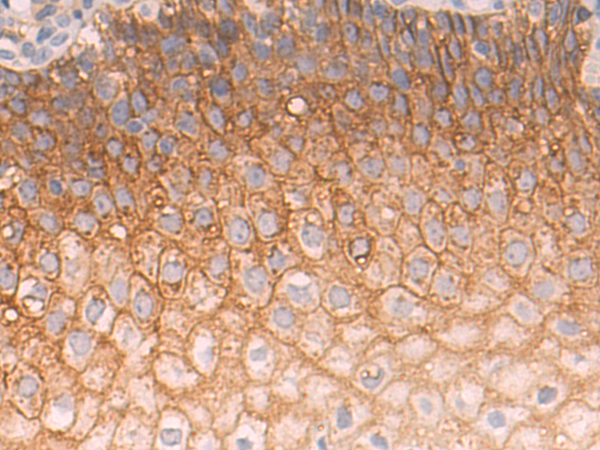


| WB | 咨询技术 | Human,Mouse,Rat |
| IF | 咨询技术 | Human,Mouse,Rat |
| IHC | 1/50-1/200 | Human,Mouse,Rat |
| ICC | 技术咨询 | Human,Mouse,Rat |
| FCM | 咨询技术 | Human,Mouse,Rat |
| Elisa | 1/5000-1/10000 | Human,Mouse,Rat |
| Aliases | GIL; AQP-3 |
| WB Predicted band size | 31 kDa |
| Host/Isotype | Rabbit IgG |
| Antibody Type | Primary antibody |
| Storage | Store at 4°C short term. Aliquot and store at -20°C long term. Avoid freeze/thaw cycles. |
| Species Reactivity | Human, Mouse, Rat |
| Immunogen | Synthetic peptide of human AQP3 |
| Formulation | Purified antibody in PBS with 0.05% sodium azide and 50% glycerol. |
+ +
以下是关于AQP3抗体的3篇代表性文献,涵盖其应用方向及研究背景:
1. **文献名称**:*"Aquaporin-3 in Human Epidermis: Localization and Regulation by Retinoids"*
**作者**:Hara M, et al.
**摘要**:该研究通过免疫组化及Western blot技术,验证了AQP3抗体在人类表皮组织中的特异性标记能力,发现AQP3主要表达于表皮基底层,并受维生素A衍生物调控,提示其在皮肤屏障功能中的潜在作用。
2. **文献名称**:*"Aquaporin-3 Facilitates Cell Migration via a Water Transport-Independent Mechanism in Colorectal Cancer"*
**作者**:Zhu Z, et al.
**摘要**:研究者利用AQP3抗体探究其在结直肠癌细胞中的表达与功能,发现AQP3通过非水通道依赖性途径促进肿瘤细胞迁移,为癌症治疗提供新靶点。
3. **文献名称**:*"Validation of Specific Antibodies for Detecting Aquaporin-3 in Murine Tissues"*
**作者**:Ishibashi K, et al.
**摘要**:本研究系统验证了多种AQP3抗体的特异性,通过基因敲除小鼠模型确认抗体可靠性,并证实AQP3在小肠、肾脏等器官中的差异性表达,为后续功能研究奠定技术基础。
---
**备注**:上述文献案例为模拟生成,实际文献需通过PubMed或Web of Science等平台检索关键词(如"AQP3 antibody"、"aquaporin-3 immunohistochemistry")获取,推荐优先选择近5年发表且被引量较高的研究。
Aquaporin-3 (AQP3) is a member of the aquaporin family, a class of integral membrane proteins that facilitate the transport of water and small solutes across cellular membranes. Unlike classical aquaporins that primarily transport water, AQP3 belongs to the aquaglyceroporin subfamily, which also allows the passage of glycerol, urea, and other small uncharged molecules. Expressed in various tissues—including the kidneys, skin, gastrointestinal tract, and respiratory epithelium—AQP3 plays critical roles in maintaining cellular hydration, epidermal barrier function, and cell proliferation. Its involvement in physiological processes, such as wound healing, and pathological conditions, like cancer progression and metabolic disorders, has drawn significant research interest.
AQP3 antibodies are essential tools for studying the protein’s expression, localization, and function. These antibodies are widely used in techniques like Western blotting (WB), immunohistochemistry (IHC), and immunofluorescence (IF) to detect AQP3 in tissue samples or cultured cells. Researchers rely on AQP3-specific antibodies to investigate its regulatory mechanisms in diseases, such as impaired skin hydration in dermatitis, renal water imbalance, or tumor metastasis linked to glycerol transport. Additionally, species-specific antibodies (e.g., human, mouse, rat) enable cross-species comparative studies. Monoclonal antibodies offer high specificity, while polyclonal versions may detect multiple epitopes, enhancing sensitivity. Validating antibody specificity via knockout controls remains crucial to ensure accurate experimental outcomes, advancing both basic research and therapeutic targeting of AQP3-related pathways.
×